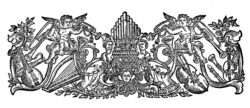Fr. Felix Gass was born in Neustadt/Saale on August 8th, 1715 as first child of the couple Johannes and Susanna Margaretha Gass, born Hundertpfundt, and baptized under the name Georg Anton. His father Johannes Gass was a clerk of the bishopric office in Neustadt.
After attending classes at the Augustinian school Gass professed to the Augustinian monastery of Muennerstadt on November 6th, 1733. In the following year he moved to the Augustinian convent of Uttenweiler where he studied moral theology. Probably after his studies he returned back to his home monastery of Muennerstadt. Therefrom Br. Felix was sent to Freiburg/B. in June 1737. On March 28th, 1739 Gass was ordained.
In the year 1740, Gass was confessor and organist in the Augustinian convent of St. Maurice in Fribourg/CH. In the year 1743 at the latest, Gass moved again to Freiburg/B. In Freiburg/B, Gass had the duties of a confessor and organist.
Gass died on February 20th, 1752 at the age of only 36 on a pulmonary catarrh that led to suffocation. All extant sources characterize him as an excellent organist and a much celebrated composer. Furthermore, he was a deeply religious and spiritual man. The prior of Muennerstadt writes about him:
„His musical abilities in playing the organ have been fully-trained and he was known as an excellent organist. Unfortunately, he was snatched in prosperous manhood from the music choir on earth and associated to the music choir in heaven as a sacred singer evermore."
At the time of the publication of his only preserved work Gass was organist in Freiburg/B. The regrettably undated work was most probably written after his return from Fribourg/CH, thus between 1743 and 1745. This work with piano arias for the keyboard bears the Baroque title „David ludens ad arcam Dei“ (= „David plays in front of the Ark of the covenant“) and was printed in Augsburg by the Protestant publisher Johann Christian Leopold the Elder (1699–1755) [RISM G 469]. This collection totally attached to the piano setting contains 30 Arias for the keyboard. The carefreeness with which Gass used song and dance pieces for a liturgical setting, testifies to late Baroque sensibility and extraversion. On account of easy playablilty he spares alto and tenor voices. Besides this printed work the necrology testifies further compositions: 12 Masses, 12 Offertories and 24 Concertos. These manuscripts have been lost so far. Furthermore Gass published a short manual to choral singing in 1746.
The Augustinian Hermit Fr. Felix Gass from the Rhoen area has left an interesting heritage that should be rediscovered by music enthusiasts and musicologists in the future.
Catalogue of Works
30 Piano Pieces
manuscript/missing:
12 Masses, 12 Offertories and 24 Concertos
 DE
DE 

